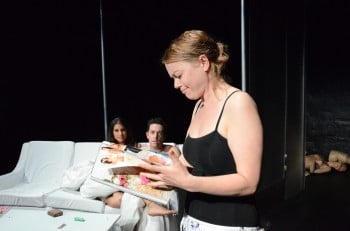Confronting Muff at The Bakehouse Theatre

5.1 have pulled off quite a coup with the world premiere stage production of this impressive and confronting play.
Some years ago, a gay friend of mine living in a large share household was distressed to find a notice on the wall saying ‘all men are rapists, even Gary’, and the link between sex, dominance and the male identity is one thread of Muff by Van Badham at the Bakehouse Theatre. This is very much a Bakehouse play; the cast of three, a story that is confronting and intimate, and a sense in the audience of voyeuristic participation. It’s a seventy minute exploration of the new sexualities head on with traditional values and beliefs
Badham is a highly experienced Australian writer who has spent much of her creative time in the United Kingdom, and the play is set in a particular middle class London milieu, though the issues are easily relevant to any community.
Eve is a professional woman in her late twenties, early thirties who was bashed and raped in a pub toilet, while Tom, her partner, was in the bar drinking with mates. The relationship falls apart and Eve, as the play begins, has just returned from three years teaching English in China. She has moved in temporarily to Tom’s spare room and meets Manpreet, his new lover, a sophisticated and sexually emancipated woman from what you surmise was probably a repressive Indian background. That she has successfully broken away from her culture is made clear in several speeches where she enumerates both her broad sexual interests and the, sometimes very physical, sex games that she plays with Tom. At one point early in the play Eve asked her ‘have you been raped?’ ‘Yes I was fifteen,’ replies Manpreet in a matter of fact fashion before continuing the conversation.
Serena Moorghen’s Australian debut as Manpreet is unforgettable. She has model looks and the mouth of a wharfie with a caustic turn of phrase and great timing. Claire Glen is mesmerising as Eve, to the extent that I keep wanting to write her name for the character’s name, so beautifully does she unfold on stage. Brad Williams as Tom holds his own, but the final slow burn as Eve confronts him needs careful timing
Eve claims to have recovered from the rape trauma, but tells Tom of the many one night stands she took part in with other Europeans in China. While she appears calm, there are several flashback moments of nightmares and hysterical screaming.
The structure of the play disrupts the linear narrative with flashbacks, narrations and two scenes which show different outcomes to one conversation. Badham’s skill as a writer means that no one is ever at any doubt as to when and where they are. Furthermore the writing is very strong and the words fit easily in the actors mouths. She also makes the decision to give Tom the speech about the rape, infused with his guilt. Some of the humour is very broad and you get a whole new vocabulary for sexual activity. Snorkelling for instance was educational as a term for lesbian sex.
Furthermore while the two women begin from two very different approaches to sexual activity, they move closer together until Manpreet succumbs to domesticity, fitting into the little woman role and Eve boasts of her new sexual calendar which includes a Tesco’s shop girl.
This triggers in Tom the brutal climax of the play. Eve is no longer the victim he was unable, drunk and negligent at the bar, to save. Her new life is a fall from the grace he has been attributing to her, just as Manpreet’s retreat into the kitchen shows her renunciation of her freedom.
Director Alison Howard has worked with her cast of three to bring out the nuances of the text as well as the broad humour, though Myf Cadwallader’s set on pivoting screens at time slows down the action because there’s a shower on a stand that needs to be moved. The shower scenes work remarkably well, but the actual object is obtrusive and unnecessary. Lighting from Chris Petridis creates useful shadows and Tristan Louth-Robbins sound scape, apart from a few glaringly loud eruptions, slides easily into the environment of the play.
